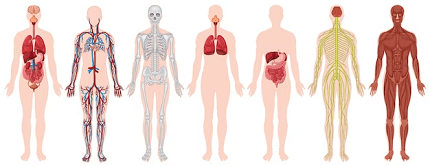Human physiology

Here’s a crash course on the NEET (National Eligibility cum Entrance Test) Biology syllabus, specifically focusing on human physiology:
- Cell Structure and Function:
- Basics of cell structure: cell membrane, cytoplasm, nucleus, organelles.
- Structure and functions of cell organelles: mitochondria, endoplasmic reticulum, Golgi apparatus, lysosomes, etc.
- Cell division: mitosis and meiosis.
- Digestive System:
- Structure and functions of the digestive system organs: mouth, esophagus, stomach, small intestine, large intestine, liver, and pancreas.
- Digestion and absorption of carbohydrates, proteins, and fats.
- Role of enzymes and hormones in the digestive process.
- Disorders of the digestive system: peptic ulcers, gallstones, constipation, etc.
- Respiratory System:
- Structure and functions of the respiratory system: nasal cavity, pharynx, larynx, trachea, bronchi, and lungs.
- Mechanism of breathing: inspiration and expiration.
- Gas exchange in the lungs: diffusion of oxygen and carbon dioxide.
- Regulation of respiration: role of medulla oblongata and chemoreceptors.
- Respiratory disorders: asthma, bronchitis, pneumonia, etc.
- Circulatory System:
- Structure and functions of the circulatory system: heart, blood vessels (arteries, veins, and capillaries), and blood.
- Cardiac cycle and the conduction system of the heart.
- Blood composition, blood types, and blood clotting.
- Transportation of oxygen, carbon dioxide, and nutrients.
- Regulation of blood pressure and blood volume.
- Disorders of the circulatory system: hypertension, atherosclerosis, anemia, etc.
- Excretory System:
- Structure and functions of the excretory system: kidneys, ureters, urinary bladder, and urethra.
- Formation of urine: filtration, reabsorption, and secretion.
- Regulation of water and electrolyte balance.
- Role of hormones in the excretory process.
- Disorders of the excretory system: kidney stones, urinary tract infections, renal failure, etc.
- Nervous System:
- Structure and functions of the nervous system: neurons, central nervous system (brain and spinal cord), and peripheral nervous system.
- Nerve impulse transmission: action potential, synapse, and neurotransmitters.
- Sensory and motor pathways.
- Reflexes and their types.
- Major parts and functions of the brain.
- Disorders of the nervous system: Alzheimer’s disease, Parkinson’s disease, stroke, etc.
- Endocrine System:
- Structure and functions of the endocrine system: major glands (pituitary, thyroid, parathyroid, adrenal, pancreas, etc.) and their hormones.
- Role of hormones in growth, metabolism, reproduction, and homeostasis.
- Negative and positive feedback mechanisms.
- Disorders of the endocrine system: diabetes mellitus, hyperthyroidism, hypothyroidism, etc.
- Reproductive System:
- Male reproductive system: structure and functions of the testes, seminal vesicles, prostate gland, etc.
- Female reproductive system: structure and functions of the ovaries, uterus, fallopian tubes, etc.
- Menstrual cycle and hormonal regulation.
- Fertilization, implantation, and development of the embryo.
- Reproductive disorders: infertility, sexually transmitted infections, etc.
It’s important to note that this crash course provides a brief overview of the NEET Biology syllabus on human physiology. It is recommended to refer to your NEET study material or textbooks for more comprehensive information and specific details.
What is Required NEET BIOLOGY SYLLABUS Human physiology
The NEET (National Eligibility cum Entrance Test) Biology syllabus for human physiology covers the following topics:
- Digestion and Absorption:
- Alimentary canal: mouth, esophagus, stomach, small intestine, large intestine, rectum, and anus.
- Digestive glands: salivary glands, liver, pancreas, and gastric glands.
- Digestive processes: ingestion, digestion, absorption, assimilation, and egestion.
- Enzymes and hormones involved in digestion.
- Disorders of the digestive system.
- Breathing and Exchange of Gases:
- Respiratory organs: nasal passages, trachea, bronchi, bronchioles, alveoli, and lungs.
- Mechanism of breathing: inspiration and expiration.
- Transport of respiratory gases: oxygen and carbon dioxide.
- Regulation of respiration.
- Respiratory disorders.
- Body Fluids and Circulation:
- Blood: composition, functions, and blood groups.
- Blood vessels: arteries, veins, and capillaries.
- Structure and functions of the heart.
- Cardiac cycle and conduction system of the heart.
- Disorders of the circulatory system.
- Excretory Products and Their Elimination:
- Structure and functions of the excretory system: kidneys, ureters, urinary bladder, and urethra.
- Urine formation: filtration, reabsorption, and secretion.
- Regulation of kidney function.
- Disorders of the excretory system.
- Locomotion and Movement:
- Structure and functions of the skeletal system: bones, joints, and muscles.
- Types of muscles: skeletal, smooth, and cardiac muscles.
- Muscle contraction and its regulation.
- Disorders of the musculoskeletal system.
- Neural Control and Coordination:
- Structure and functions of the nervous system: neurons, central nervous system (brain and spinal cord), and peripheral nervous system.
- Generation and conduction of nerve impulses.
- Structure and functions of the brain.
- Reflex action and sensory perception.
- Disorders of the nervous system.
- Chemical Coordination and Regulation:
- Endocrine glands and their hormones: pituitary, thyroid, parathyroid, adrenal, pancreas, etc.
- Functions and regulation of hormones.
- Role of hormones in growth, development, and homeostasis.
- Disorders of the endocrine system.
- Reproduction:
- Reproductive systems: male and female.
- Gametogenesis and gamete transfer.
- Menstrual cycle and hormonal control.
- Fertilization, implantation, and embryonic development.
- Reproductive health and disorders.
This is a general outline of the required NEET Biology syllabus for human physiology. It’s important to refer to the official NEET syllabus and your study material for more detailed and specific information.
Case Study on NEET BIOLOGY SYLLABUS Human physiology
Diabetes Mellitus and its Impact on Human Physiology
Introduction: Diabetes Mellitus is a chronic metabolic disorder characterized by elevated blood glucose levels due to insufficient insulin production or ineffective utilization of insulin by the body. This case study explores the impact of diabetes mellitus on human physiology, focusing on the endocrine system, circulatory system, and urinary system.
Patient Profile: Name: Mr. John Smith Age: 55 years Gender: Male Medical History: Type 2 Diabetes Mellitus diagnosed 10 years ago Current Symptoms: Frequent urination, excessive thirst, fatigue, and unexplained weight loss.
Physiological Impact:
- Endocrine System:
- In a healthy individual, the pancreas produces insulin, a hormone that regulates blood glucose levels. However, in diabetes mellitus, the pancreatic beta cells fail to produce sufficient insulin or the body becomes resistant to insulin.
- Due to insulin deficiency or resistance, glucose uptake by body cells is impaired. As a result, the level of glucose in the bloodstream remains elevated, leading to hyperglycemia.
- Hyperglycemia triggers the release of glucagon, a hormone produced by the alpha cells of the pancreas. Glucagon stimulates the liver to convert glycogen into glucose and release it into the bloodstream, further exacerbating hyperglycemia.
- Circulatory System:
- Persistent hyperglycemia in diabetes mellitus can lead to long-term complications that affect the circulatory system. Elevated blood glucose levels can cause damage to blood vessels, leading to a condition called diabetic angiopathy.
- Diabetic angiopathy can manifest as microangiopathy (damage to small blood vessels) and macroangiopathy (damage to larger blood vessels). Microangiopathy affects organs such as the eyes (diabetic retinopathy), kidneys (diabetic nephropathy), and nerves (diabetic neuropathy).
- Macroangiopathy increases the risk of atherosclerosis, narrowing and hardening of blood vessels, which can lead to cardiovascular diseases such as coronary artery disease, stroke, and peripheral vascular disease.
- Urinary System:
- The kidneys play a crucial role in maintaining blood glucose levels by filtering excess glucose from the bloodstream and excreting it in the urine. In diabetes mellitus, the elevated glucose levels overwhelm the kidney’s capacity to reabsorb all the glucose, resulting in glucosuria (glucose in the urine).
- Glucosuria leads to an increased osmotic load in the renal tubules, resulting in increased water loss through urine. This, in turn, causes frequent urination (polyuria) and excessive thirst (polydipsia) as the body tries to compensate for fluid loss.
- Over time, the constant high glucose levels and increased workload on the kidneys can lead to diabetic nephropathy, a progressive kidney disease characterized by damage to the glomeruli and renal tubules. This can eventually result in kidney failure if left uncontrolled.
Management and Treatment:
- Mr. John Smith’s diabetes mellitus will require ongoing management to control his blood glucose levels. This may include a combination of lifestyle modifications, such as adopting a healthy diet, regular exercise, and weight management, along with medication or insulin therapy.
- Regular monitoring of blood glucose levels will be essential to adjust treatment and maintain optimal glycemic control.
- Additionally, Mr. Smith will need to undergo regular screenings for complications associated with diabetes, including eye examinations, kidney function tests, and cardiovascular assessments.
Conclusion: This case study highlights the physiological impact of diabetes mellitus on the endocrine system, circulatory system, and urinary system. Diabetes mellitus disrupts the regulation of blood glucose levels, leading to hyperglycemia, increased risks of cardiovascular complications, and kidney damage. Effective management and adherence to treatment strategies are crucial to mitigate these risks and maintain a good quality of life for individuals with diabetes mellitus.
White paper on NEET BIOLOGY SYLLABUS Human physiology
Understanding Human Physiology: A Comprehensive Overview for NEET Biology
Abstract:
This white paper provides a comprehensive understanding of human physiology, focusing on the topics included in the NEET (National Eligibility cum Entrance Test) Biology syllabus. Human physiology is a fundamental branch of biology that explores the functioning of various systems within the human body and their interactions. This white paper aims to serve as a valuable resource for NEET aspirants, providing in-depth insights into the physiological processes and mechanisms involved.
Table of Contents:
Introduction to Human Physiology
1.1 Definition and Scope
1.2 Importance in Medical Sciences
Cell Structure and Function
2.1 Cellular Components
2.2 Cell Membrane and Transport Mechanisms
2.3 Cellular Respiration and Energy Production
Digestive System
3.1 Anatomy and Function of Digestive Organs
3.2 Digestion and Absorption of Nutrients
3.3 Role of Enzymes and Hormones
Respiratory System
4.1 Structure and Function of Respiratory Organs
4.2 Gas Exchange and Transport of Oxygen and Carbon Dioxide
4.3 Mechanism of Breathing and Regulation
Circulatory System
5.1 Anatomy and Physiology of the Heart
5.2 Blood Vessels and Circulation
5.3 Blood Composition and Functions
5.4 Regulation of Blood Pressure and Blood Flow
Excretory System
6.1 Kidney Structure and Function
6.2 Urine Formation and Filtration
6.3 Regulation of Water and Electrolyte Balance
6.4 Disorders of the Excretory System
Nervous System
7.1 Neurons and Nervous Tissue
7.2 Structure and Functions of the Central and Peripheral Nervous Systems
7.3 Synaptic Transmission and Neurotransmitters
7.4 Sensory and Motor Pathways
7.5 Disorders of the Nervous System
Endocrine System
8.1 Endocrine Glands and Hormones
8.2 Regulation of Hormonal Secretion
8.3 Role of Hormones in Growth, Development, and Homeostasis
8.4 Disorders of the Endocrine System
Reproductive System
9.1 Male and Female Reproductive Anatomy
9.2 Gametogenesis and Fertilization
9.3 Hormonal Regulation of Reproduction
9.4 Pregnancy and Embryonic Development
9.5 Reproductive Health and Disorders
Integration of Systems and Homeostasis
10.1 Coordination and Communication Between Systems
10.2 Homeostatic Mechanisms and Feedback Regulation
Common Disorders and Diseases
11.1 Diabetes Mellitus
11.2 Cardiovascular Diseases
11.3 Respiratory Disorders
11.4 Renal Disorders
11.5 Neurological Disorders
Conclusion
By delving into each topic mentioned above, NEET aspirants will gain a comprehensive understanding of human physiology and be better equipped to tackle questions related to this subject in the examination. This white paper serves as a valuable reference material, providing an organized and detailed overview of the NEET Biology syllabus for human physiology.
